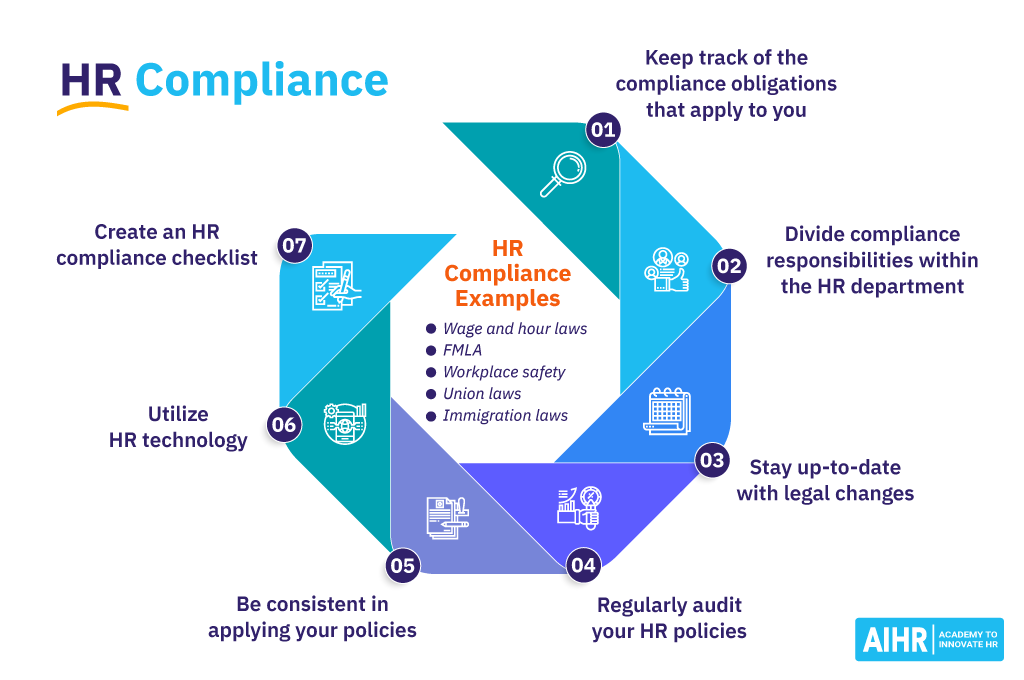HR Compliance
What is HR Compliance?

Definition:
HR Compliance refers to the set of policies, procedures, and practices that organizations implement to ensure they adhere to laws and regulations governing human resources and employment. It involves the systematic management of employment-related matters to mitigate legal risks, promote fair and ethical practices, and create a compliant and respectful workplace environment.
Analogy:
Consider HR Compliance as the rulebook for a sports game. Just as a well-defined rulebook governs players’ actions, HR compliance guides organizations in navigating employment laws, fostering fair treatment, and ensuring ethical conduct within the workplace.
Further Description:
HR Compliance involves various components essential for legal and ethical human resource management:
Legal Framework: Stay abreast of local, state, and federal employment laws, regulations, and standards to ensure organizational policies align with legal requirements.
Policy Development: Develop and communicate HR policies that cover areas such as hiring, termination, discrimination, harassment, compensation, and workplace safety, ensuring compliance with relevant laws.
Record-Keeping: Maintain accurate and up-to-date records related to employee information, contracts, benefits, and training, facilitating transparency and compliance during audits or legal inquiries.
Training and Education: Provide ongoing training to employees and management on HR policies, diversity and inclusion, workplace conduct, and other relevant topics to promote understanding and compliance.
Equal Employment Opportunity (EEO): Implement practices that ensure equal opportunities for all employees, regardless of race, gender, age, or other protected characteristics.
Wage and Hour Compliance: Adhere to regulations related to minimum wage, overtime pay, and working hours to prevent legal disputes and maintain fair compensation practices.
Safety and Health Compliance: Establish and maintain safety protocols to comply with occupational safety and health regulations, ensuring a secure and healthy work environment.
Employee Relations: Address workplace grievances and conflicts promptly and fairly, following established procedures to mitigate legal risks and foster a positive work culture.
Why is HR Compliance Important?
Legal Risk Mitigation: Compliance helps organizations avoid legal penalties, fines, and lawsuits by ensuring adherence to employment laws and regulations.
Employee Satisfaction: Creating a workplace that complies with ethical and legal standards contributes to employee satisfaction and retention.
Organizational Reputation: Ethical and compliant practices enhance the organization’s reputation, attracting top talent and building trust with clients, customers, and stakeholders.
Operational Efficiency: Streamlining HR processes and ensuring compliance reduces the risk of disruptions and enhances overall operational efficiency.
Crisis Prevention: Proactive compliance measures help prevent workplace crises and legal disputes, protecting the organization’s interests and reputation.
Examples and Usage:
Google: Google places a strong emphasis on HR compliance by providing extensive training programs, clear policies, and resources to ensure employees understand and follow the company’s ethical and legal standards.
Walmart: As a large retail employer, Walmart focuses on HR compliance to address wage and hour regulations, workplace safety, and equal employment opportunities across its vast workforce.
Small Businesses: Small businesses also prioritize HR compliance by implementing employee handbooks, conducting regular training sessions, and seeking legal guidance to navigate employment laws.
Key Takeaways:
- Stay informed about and adhere to local, state, and federal employment laws and regulations.
- Develop comprehensive HR policies that align with legal requirements and ethical standards.
- Maintain accurate and up-to-date records to demonstrate compliance during audits or legal inquiries.
- Provide ongoing training to employees and management to promote understanding and compliance with HR policies.
- Implement practices to ensure equal opportunities for all employees, fostering a diverse and inclusive workplace.
- Adhere to regulations related to minimum wage, overtime pay, and working hours to maintain fair compensation practices.
- Establish and maintain safety protocols to comply with occupational safety and health regulations.
- Address workplace grievances and conflicts promptly and fairly, following established procedures to mitigate legal risks and promote a positive work culture.




